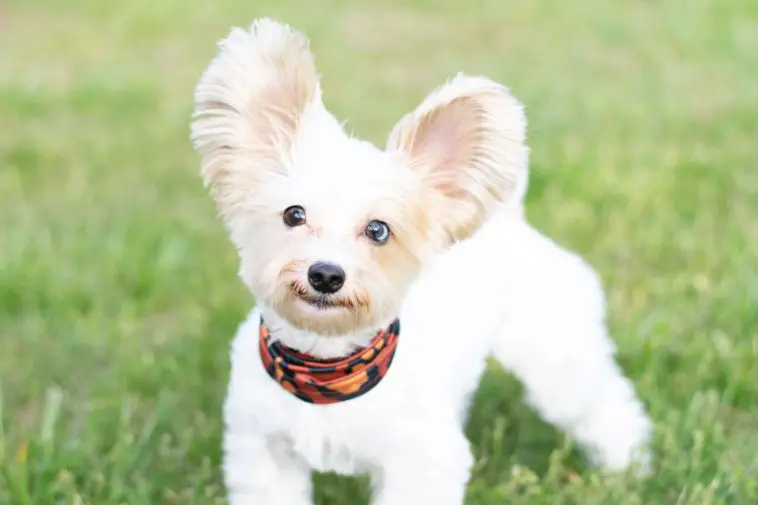It is never a pleasant sight to see your Yorkie bark over strangers or your guests, or maybe just other dogs. So, if you are wondering about How To Calm Down Your Yorkie, you’ve come to the right place.
In this article, we will learn about:
- Top 11 Ways To Calm A Yorkie Down
- 5 Anxiety Symptoms in Yorkies
- And many more…
How To Calm A Yorkie Down?
The best way to deal with a hyperactive Yorkie is by calming it down by channelizing his energy in games, providing at least 30 minutes of daily walk or exercise, using positive reinforcement techniques like giving treats, buying toys, and practicing crate training.
11 Simple Ways To Calm A Yorkie Down
1. Exercise your Yorkie regularly
Yorkies, like any other dog, benefit greatly from exercising daily. They should get at least 30 minutes of exercise per day. They tend to perform better when the time is divided into two brisk walks. This is one of the most crucial steps in a hyper behavior training program.
According to PetMD, most Yorkies become calmer and respond better to training after exercising.
2. Reward your Yorkie for calm behavior
Firstly, determine what “calm” behavior means to you. When it comes to rewarding your Yorkie for desired behavior, the behavior must first be defined.
You should reward your Yorkie if it displays the desired behavior consistently by obeying your command. Take note of the fact that your furry friend might take some time to adjust to this process of achieving your desired behavior.
3. Increase playtime
While playing games with your Yorkie, the overall goal is to keep them mentally stimulated while also giving them some much-needed attention. Yorkies are small creatures and therefore you can usually get away with playing games with them indoors without fear of them knocking over your furniture or destroying your home decor.
4. Create consequences for hyperactive behavior
PetMD states that unwanted behavior in dogs is frequently the result of anxiety. If you are yelling, chasing, or being loud to punish them, it may have a negative effect. This can make them feel more anxious, exacerbating the unwanted behavior. Alternatively, they may find it enjoyable and regard it as playtime.
One of the best responses is to ignore unwanted behavior as much as possible. Yorkies thrive on being the center of attention. It can have a notable impact on their behavior if they are not given attention when they are out of control. This will take some time and patience, but they should eventually grasp the concept.
5. Socializing with other dogs
Interacting with other dogs is a great way for Yorkies to get extra attention. Many people get multiple dogs so that they can keep each other occupied when the owner is not present.
If you decide to train your dog for socialization, first, make sure if your Yorkie is ready to socialize with other dogs. Many Yorkies, especially those who have not been properly socialized from a young age, do not get along with other dogs.
Ensure that socialization takes place in a safe environment. No matter how friendly two dogs appear to be, don’t leave them alone to play the first time they meet. Even the friendliest dogs can decide to assert dominance, resulting in one of the dogs being injured.
6. Crates help in calming your dogs
According to Dr. Monique Feyrecilde, DVM, crates can be very calming for dogs and can help with anxiety, but only if they have been properly trained to use them.
Many dogs are crate trained for nights or when they are left alone during the day. They can come to regard their crate as a “safe haven” in which to sleep. It’s critical that the dog sees his or her crate as a safe haven. Putting them in a cage as a form of punishment can have disastrous consequences.
If you’re new to No products found. and are having a difficult time making your dog stay in there, then I recommend you watch a couple of tutorials before getting your head into the struggle.
Once your Yorkie has been properly crate-trained, putting them in the crate when visitors come to the house is a great way to prevent hyperactivity. Your Yorkie can be let out and allowed to greet the visitor once they have calmed down inside their crate.
7. Establish your dominance
The following guidelines can aid in the development of dominance.
- Feeding Instructions: Make sure that your Yorkie understands who controls and supplies the food to establish dominance. This method can be used by everyone in the house to teach the Yorkie to listen to each family member.
- The Gatekeeper Rule: Dogs consider the house to be their home or “den.” Without a “pack leader,” Yorkies will often believe they are in charge of who comes and goes, establishing themselves as dominant and ignoring others. As a result, it’s critical to establish a firm rule that all humans enter and exit the house first, followed by dogs.
- Teach Commands: It is critical that a Yorkie understands the commands that are expected of it. The five basic commands should be taught to all dogs: sit, stay, come, down, and heel. The best way to teach these commands is by using the positive reinforcement method. Setting up a hierarchy will encourage your Yorkie to respond to commands that will help him relax.
Also Read: Are Yorkies Easy To Train?
8. Meeting attention/affection needs
Yorkies are incredibly affectionate dogs who crave a lot of attention. Many of their hyperactive behaviors can be attributed to a desire for attention. When they are ignored or left alone for long periods of time, they will demand even more attention.
More often than not, alternative attention is preferable to no attention at all. Hiring a dog walker, enrolling your Yorkie in doggy daycare, or taking lunch breaks at home are all options for keeping your Yorkie from being alone for long periods of time.
Ensure that you reserve quality time to interact and play with your pet to form a strong bond with it. Yorkies will love a cuddle and all the coziness that it provides after some strenuous exercise and play, so keep aside some time for that as well.
According to PetMD, interaction with owners on a regular basis aids in meeting the needs of dogs.
9. Impulse control
Many of the common “tricks” taught to dogs are meant to help them control their impulses. Sitting, staying, and even waiting for an eat command teaches a dog to wait and control its impulses.
It takes more time and patience to practice these tricks with a hyperactive Yorkie, but it can be one of the most effective ways to enhance your dog’s calm behavior.
Don’t set goals for your dog that are too high for it to achieve. This will irritate both you and your Yorkie. It’s important to praise or reward the dog after just a few seconds of staying when teaching them to stay, especially if the Yorkie is hyperactive. Once the basic skill has been mastered, the time can be increased gradually.
10. Feed warm milk with honey
Feeding warm milk with honey is a good option because honey is high in vitamins, minerals, and antioxidants, which your dog requires to stay happy and healthy. It can also aid in the management of allergy symptoms, skin problems, and weight management. However, because it is high in sugar, it should be consumed with caution.
Read Also: Best Dog Food For Yorkie
11. Provide an outlet to channelize energy but with limitations
The main cause of a dog becoming hyperactive is stored energy. If the pent-up energy is channelized into other activities, your dog will remain calm. If you do not have the time to make your dog exercise, you can get some puzzle games that will engage your dog physically and mentally when you are away.
What Are The Yorkie Anxiety Symptoms?
1. Barking or howling when you’re not at home
Excessive Yorkie crying or barking is one of the most common signs that your Yorkie is worried while you’re away. It could be a sign of anxiety if your normally well-behaved Yorkie has a vocal meltdown in stressful or lonely situations.
Anxious barking is usually higher-pitched, unsettled, and frantic in comparison to playful or prey-driven barking. It’s also a lot louder than normal barking.
2. Panting and shivering
If your Yorkshire Terrier shakes when you leave the house or begins to tremble violently and can’t seem to stop when you leave him alone in a room, he may have separation anxiety. Separation anxiety can be alleviated with dog training.
PetMD states that car rides are often associated with unpleasant events in dogs’ lives, such as visits to the veterinarian or groomer. Panting, pacing, shaking, hyper-arousal, vocalization, salivation, vomiting, and, possibly, urination and defecation are some of the symptoms of travel anxiety.
Read Also: Why Do Yorkies Shake?
3. Digging or escaping the yards
Some tense dogs literally move behind their owners to hide, which is an extension of avoidance. According to Dr. Malcolm Weir, DVM, they may even nudge their owners in order to get them to move because they feel anxious around strangers.
4. Destroying furniture
While the owner is away, a previously well-behaved Yorkie may become destructive. Damage is frequently found near the entry and exit points, such as windows and doors, while the dog waits for the owner to get back.
Read Also: Can Yorkies Be Left Alone?
They may chew on items such as pillows or window blinds around the house. If confined, they may try to break free from their confinement, resulting in painful injuries and costly veterinary treatment. If you want to know more, you could find more information on why is my Yorkie is so aggressive?
5. Inability to stay patient
After a bath or a roll in the grass, you’ve probably seen your Yorkie shake. Unless it occurs as a result of a stressful situation, that whole-body shake can be amusing and quite normal. When they leave the exam table and land on the ground, many Yorkies “shake it off.” Dogs, like people, experience anxiety and become impatient.
When Will My Yorkie Calm Down?
When Yorkies reach the age of two, they naturally calm down. They mature to the point where they don’t need as much energy as they did when they were puppies. Each Yorkie, however, is a one-of-a-kind creation. Some dogs will calm down a little earlier than this, while others will never seem to calm down at all.
Keep in mind that just because the Yorkie begins to calm down naturally does not mean the energy will vanish. The amount of energy displayed by your Yorkie will decrease noticeably, but this does not mean that all of the energy will vanish. They’ll still need plenty of walks and playtime, and they’ll get antsy and want you around. However, there will be a decrease in energy, so you’ll have something to look forward to when they’ve exhausted you!
Will Neutering My Yorkie Calm Him Down?
It’s unlikely that neutering your Yorkie puppy will help with hyperactivity because the procedure affects their hormones and not their genetic makeup. Their personalities will remain unaffected.
However, according to Dr. Krista Williams, DVM, you may notice some changes in their behavior after neutering or spaying your Yorkie. This may include, but is not limited to, the following:
- Decrease in roaming around
- Less mounting
- Reduced aggression toward people and other dogs
- Reduction in territory marking
- Territorial instincts honed over time
If your dog’s habits include biting fingers, jumping up, or tearing around the house, you’ll find that they’re all still present after neutering.



